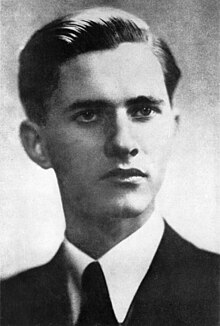Paul Keres
| Paul Keres | |
|---|---|
 | |
| Full name | Paul Keres |
| Country | Estonia Soviet Union |
| Title | Grandmaster |
| Peak rating | 2615 (July 1971) [1] |
Paul Keres (7 January 1916 – 5 June 1975) was an Estonian and Soviet chess grandmaster. From about 1937 to 1962 he was one of the top four players in the world.
Keres narrowly missed a chance at a World Chess Championship match on five occasions.[2]p197 He came equal first in the 1938 AVRO tournament, which led to negotiations for a world championship match with Alexander Alekhine, but the match never took place due to World War II. Instead, he played a 14-game match with ex-World Champion Max Euwe in the Netherlands, December 1939 – January 1940. Keres won a hard-fought struggle by 7.5–6.5 (+6 =3 –5). This was a superb achievement: not only was Euwe a former World Champion, but he had enormous experience at match play, far more than Keres.
Estonia had enjoyed independence after World War I, but was annexed by the Soviet Union in 1940. Keres came second to Botvinnik in the 1941 Leningrad/Moscow Absolute Championship of the USSR. Soon Estonia was annexed again, this time by the Nazi forces. After the war it was seized again by the Soviet Union.
After the war he took part in the 1948 World Championship match-tournament of five top players, which decided the successor to Alekhine. This was won by Botvinnik, and Keres came equal third with Reshevsky. He was then the runner-up in the Candidates' tournament on four consecutive occasions: 1953, 1956, 1959 and 1962. Keres won the USSR championship three times, in 1947, 1950 and 1951. The latter was probably the strongest-ever Soviet championship; it had ten other players who had played in Candidates' tournaments, three of whom won the world title.
Keres played for the USSR in seven successive Chess Olympiads, wining seven team medals, and five individual board medals. Due to these and other strong results, many commentators consider Keres to be the strongest player never to become World Chess Champion. He was nicknamed "The Crown Prince of Chess".[2]p198
Keres was always a man, and never missed the opportunity to say he was an Estonian, not a Russian. When he played at the annual Hastings tournament in 1954/55, a KGB man sat on a chair outside his room at night. He was there "to prevent the grandmaster being disturbed". Paul's demeanor at the board was always totally calm. From looking at him, you could not tell how much time he had left, or what kind of position he had. He had mastered the art of self-control, and his nickname amongst other players was 'Old Stoneface'.
Botvinnik thought his death was "the greatest loss suffered by chess since the death of Alekhine". In his opinion, Keres failed to reach the top because of "a tendency to fade somewhat at decisive moments in the struggle".[2]p198 A rumour that the Soviets had persuaded him to lose deliberately to Botvinnik in the 1948 World Championship has no evidence to back it up.
Keres memorial tournaments are held in Tallinn every two years.
Games[change | change source]
- Paul Keres vs Alexander Alekhine, Margate 1937, Ruy Lopez (C71), 1-0 A good example of the young Keres against the reigning world champion.
- Paul Keres vs Edgar Walther, Tel Aviv 1964, King's Indian, Petrosian System (E93), 1-0 Keres with 1.d4 against the King's Indian defence.
References[change | change source]
Other sources[change | change source]
- Keres, Paul 1996. Paul Keres: the road to the top. Batsford, London. The years 1929–1950. ISBN 0-7134-8062-9
- Keres, Paul and Nunn J. 1997. Paul Keres: The quest for perfection. Batsford, London. The years 1950–1975. ISBN 0-7134-8062-9
- Varnusz, Egon. 1994. Paul Keres' best games, volume 1: closed games. Cadogan Chess, London. ISBN 1-85744-064-1.
- Varnusz, Egon. 1994. Paul Keres' best games, volume II: semi-open games. Cadogan Chess, London. ISBN 0-08-037139-6.
- Paul Keres: photographs and games. Paide 1995. Complete collection of games, and record of his chess career.
- Neishtadt I. 1983. Paul Keres chess master-class. transl. K.P. Neat. Pergamon, Oxford.
